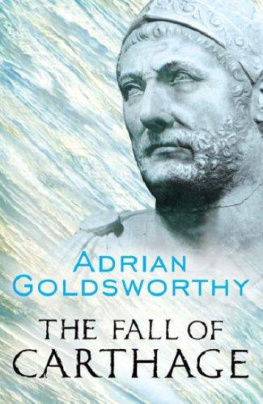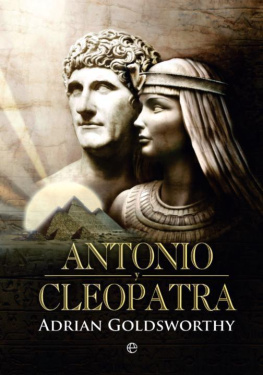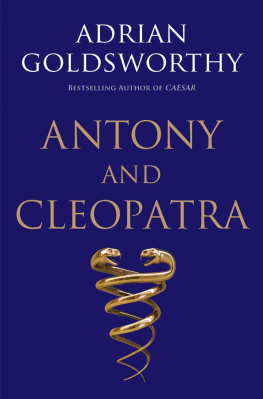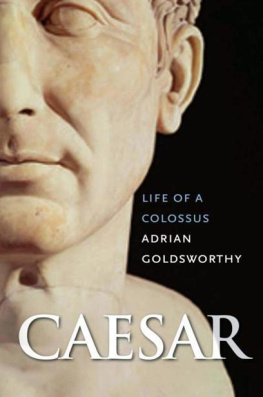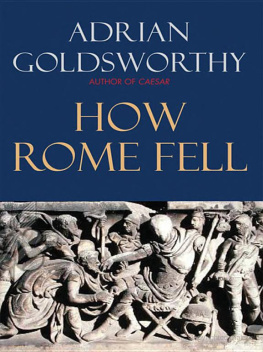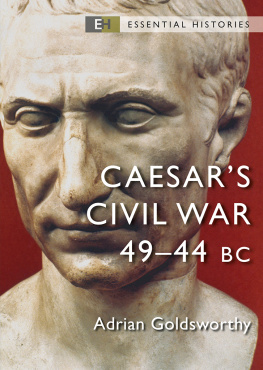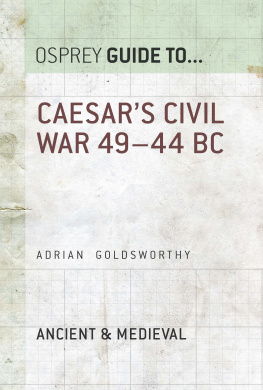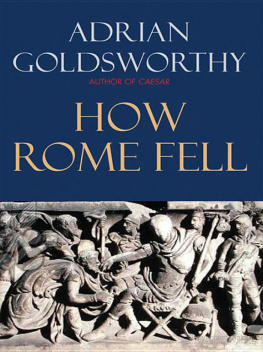IN THE NAME OF ROME
BY THE SAME AUTHOR
NON-FICTION
The Roman Army at War, 100 BCAD 200
Roman Warfare
The Fall of Carthage: The Punic Wars 265146 BC
Cannae: Hannibals Greatest Victory
The Complete Roman Army
Caesar: The Life of a Colossus
The Fall of the West: The Death of the Roman Superpower
Antony and Cleopatra
Augustus: First Emperor of Rome
FICTION
True Soldier Gentlemen
Beat the Drums Slowly
Send Me Safely Back Again
All in Scarlet Uniform
Run Them Ashore
IN THE NAME OF ROME
THE MEN WHO WON THE ROMAN EMPIRE
ADRIAN GOLDSWORTHY
With a New Preface

First Yale University Press edition 2016.
First published in Great Britain in 2003 by Weidenfeld & Nicolson.
Paperback edition first published in 2004 by Phoenix, an imprint of Orion Books Ltd.
Preface to the Yale University Press Edition copyright 2016 by Adrian Goldsworthy.
Copyright Adrian Goldsworthy, 2003.
All rights reserved. This book may not be reproduced, in whole or in part, including illustrations, in any form (beyond that copying permitted by Sections 107 and 108 of the U.S. Copyright Law and except by reviewers for the public press), without written permission from the publishers.
Yale University Press books may be purchased in quantity for educational, business, or promotional use. For information, please e-mail (U.K. office).
Printed in the United States of America.
Library of Congress Control Number: 2015950570
ISBN 978-0-300-21852-7 (paperback: alk. paper)
A catalogue record for this book is available from the British Library.
This paper meets the requirements of
ANSI/NISO Z39.48-1992 (Permanence of Paper).
10 9 8 7 6 5 4 3 2 1
In memory of
Captain William Walker RFA (retired)
Uncle Bill
A good friend and a true leader
19332002
CONTENTS
LIST OF MAPS AND DIAGRAMS
PREFACE TO THE YALE UNIVERSITY PRESS EDITION
IT IS NOW MORE THAN A DOZEN YEARS SINCE I WROTE IN THE NAME OF ROME , although at that stage it was provisionally entitled Imperator. It is more than twenty years since I listened to lectures given by our Colonel in the OTC at Oxford University. (I am pleased to say that he had no objection to being described as a properly fed Monty, but then I would never have written the words if I had thought that they might cause offence.) Since then, apart from some shorter works and articles, I have written four long works on aspects of Roman history and will finish the fifth at the end of this year. The chapters on Julius Caesar and Pompey in this book led to much fuller treatments in Caesar: Life of a Colossus (2006), while Julian and Belisarius featured in How Rome Fell: Death of a Superpower (2009). I have little doubt that I will return to several of the subjects in this book, whether to look at the generals themselves, their eras or particular parts of the empire.
Each time you look at a topic you tend to see things you have not noticed before. Occasionally this is because new evidence has appeared, sometimes it comes from a fresh thesis presented by a scholar, usually on a much broader issue, and even more often something just jumps out from the sources in a way it had not done before. I have never yet read any sizeable chunk of Caesars Bellum Gallicum without seeing something new. Your focus at the time, recent reading in other accounts and the gradual development and modification of ideas all contribute to looking at the same text in a slightly different way. This is rarely a question of the overall interpretation and far more about detail and revealing more of the context to an action, so helping to explain it.
A common question I am asked is which of my books is my favourite. The choice is getting wider, and Augustus: First Emperor of Rome (2014) was my tenth work of nonfiction, but the answer is always the next one. It is a great joy to move on to a new aspect of ancient history and be able to immerse myself in it for three years or so, researching and then writing. My hope is that each new book is better than its predecessors, both as history and in its readability. Historians never stop learning, gaining wider knowledge of their own field and also of other periods and topics which may provide useful comparisons. Even more than the study of history, writing is a craft learned through practice. You learn through doing, which means that looking back at earlier efforts comes with a strong urge to re-write themeven though this is rarely a good idea.
When I came to look again at In the Name of Rome it surprised me that there really is very little that I would wish to change. (Once or twice a bright idea proved to be something I had included in the first place and forgotten abouttwelve years is a long time, and I have written getting on for a million words since then on various aspects of Roman history.) The selection of generals still strikes me as sound. It would have been nice to have someone from the third century AD , but there is not enough evidence to trace any individuals campaigns with the same level of detail as in the other chapters. Aurelian was the only one I considered, but I still feel that it is difficult to analyze his campaigns with such poor sources. Corbulo makes a good contrast to the succession of imperial princes like Germanicus and Titus or the Emperor Julian. The true talents of these last three are debatable and in each case they were given command on the basis of family connection. Yet since the other commanders in the book owed their own prominence to political success, we should be cautious before marking these down as wholly different from the others.
The main aim of the book was always to trace the changing relationship between commander and state and, in the process, give an overview of the way the Roman military worked in each period, and in particular how its high command functioned. Each man can only be understood by placing him within the context of his era and culture. Given that we start with a Republic controlling no more than Italy, Sicily and Sardinia/Corsica, follow its expansion throughout the Mediterranean and beyond and the resulting convulsions of civil war which led to the rule of emperors, and then later the fragmentation of the empire into western and eastern halves, with the former collapsing and the latter continuing to thrive, these are vast subjects. Simply when it comes to background each chapter could be made far longer. Tempting though it was (and is) to add more detail, and to admit that some issues are far more complicated than a summary suggests, expansion would quickly render the whole book unwieldy. Covering more than seven centuries of Romes history, primarily from a military perspective, inevitably means that the best that can be hoped for is to give some flavour for each period.
Trying to understand these fifteen men remains a far more useful exercise than judging them or ranking them against each other or commanders from other eras. There may be lessons for leaders today to learn from the ancient past, but if so, then it is vital that we must first do our best to examine that past on its own terms. I am no more inclined to write Management Success the Roman Way now than I was earlier. This book is about trying to understand these commanders as best we can, but it is worth reminding ourselves once again that there is much we do not and cannot know about the events of so many centuries ago. In 1935 the future Field Marshal Lord Wavell, commander in the Western Desert from 1940 to 1941 and later in the Far East, wrote to the historian Liddell Hart saying that the principles of strategy and tactics, and the logistics of war, are really absurdly simple, it is the actualities that make war so complicated and so difficult, and are usually so neglected by historians. So many factors of fatigue, weather, hunger, chance and confused information about his own side, let alone the enemy, clutter the mind of the human being who happens to be in command of an army. In our case, almost all such material is lost for the Romans, let alone their foreign adversaries, and we are forced to piece together the story from very little evidence.
Next page

